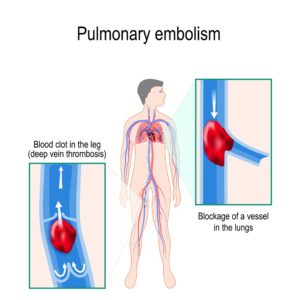 A pulmonary embolism is a blockage of an artery in the lung. In most cases, an embolism results from a blood clot that has traveled to the lung. When this occurs blood flow is obstructed which increases the risk of serious damage to organs or death. However, if symptoms are recognized and treatment is received promptly these risks can be reduced.
A pulmonary embolism is a blockage of an artery in the lung. In most cases, an embolism results from a blood clot that has traveled to the lung. When this occurs blood flow is obstructed which increases the risk of serious damage to organs or death. However, if symptoms are recognized and treatment is received promptly these risks can be reduced.
Symptoms of a pulmonary embolism may vary depending on the size of the clot, how much of your lung is affected or if you have preexisting health conditions such as heart or lung disease. Symptoms tend to come suddenly and may include:
- Shortness of breath
- Blue nails or lips
- Chest pain, which may worsen with exertion or each time you breathe deeply
- Coughing that may produce bloody or blood-streaked sputum
- Lightheadedness
- Excessive sweating
If you are experiencing these symptoms it is highly advised that you seek immediate medical attention.
Knowing your risks and exercising preventative measures can also reduce your chances of developing a pulmonary embolism. You are at an increased risk if you:
- Are pregnant
- Are taking estrogen supplements or birth control pills that contain estrogen
- Are a smoker
- Recently had major surgery
- Have a disease that increases the risk of blood clotting
- Are obese
- Are on bed rest or confined to a space for an extensive amount of time
You can prevent the occurrence of a pulmonary embolism by:
- Taking medication(blood thinners) as prescribed
- Elevating legs
- Wearing compression stockings as recommended
- Being physically active or moving around as much as possible
- Drinking plenty of fluids
Pulmonary medicine is the branch of medicine that deals with the causes, diagnosis, prevention and treatment of diseases affecting the lungs. The Division of Pulmonary Medicine at Flushing Hospital Medical Center is dedicated to providing outstanding inpatient and outpatient care through the use of certified physicians and modern research.
To learn more about the Division of Pulmonary Medicine at Flushing Hospital or to schedule an appointment with a specially-trained physician, please call 718-670-5639.
All content of this newsletter is intended for general information purposes only and is not intended or implied to be a substitute for professional medical advice, diagnosis or treatment. Please consult a medical professional before adopting any of the suggestions on this page. You must never disregard professional medical advice or delay seeking medical treatment based upon any content of this newsletter. PROMPTLY CONSULT YOUR PHYSICIAN OR CALL 911 IF YOU BELIEVE YOU HAVE A MEDICAL EMERGENCY.
